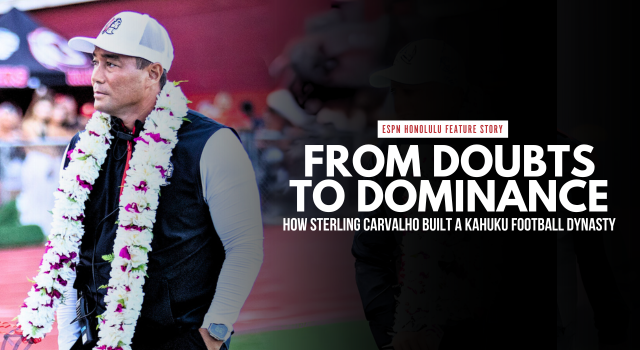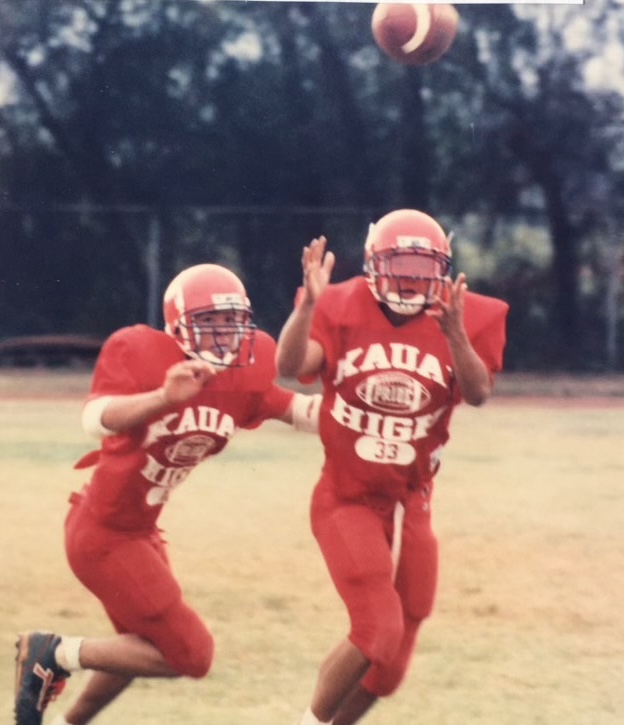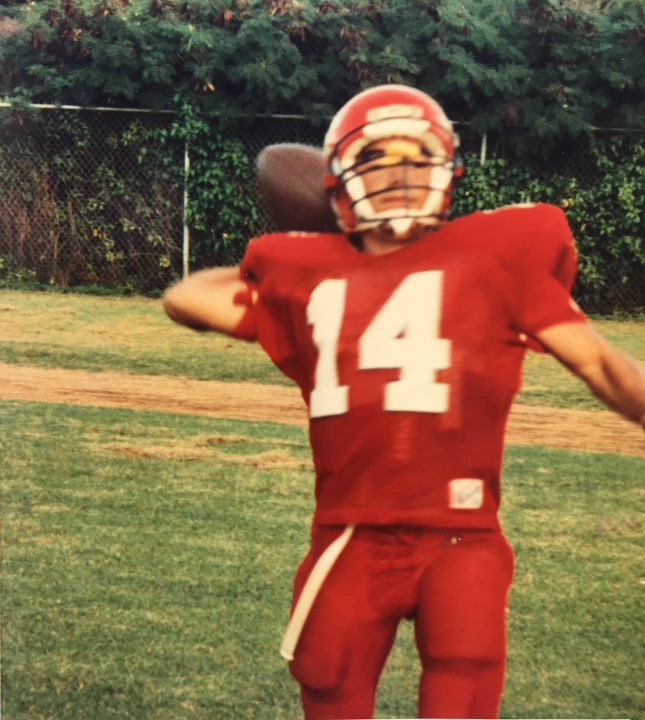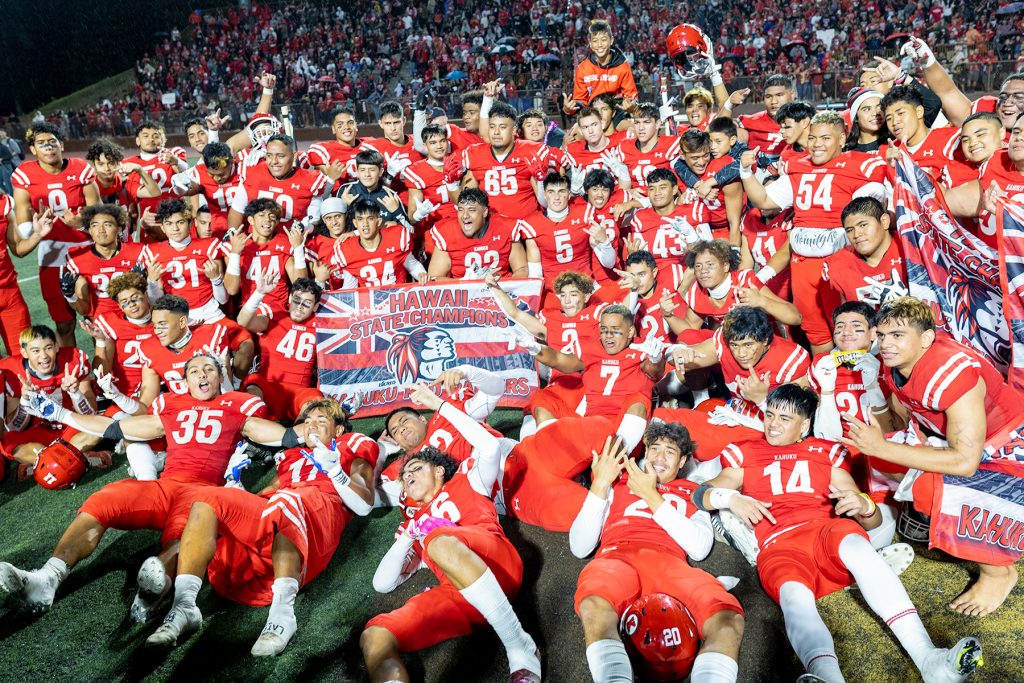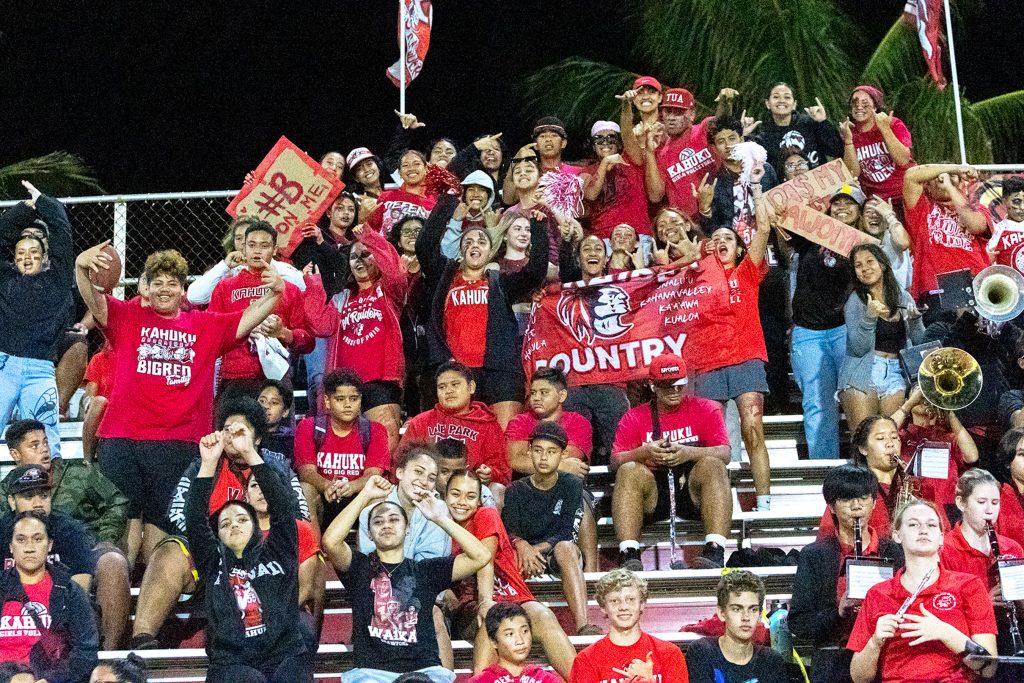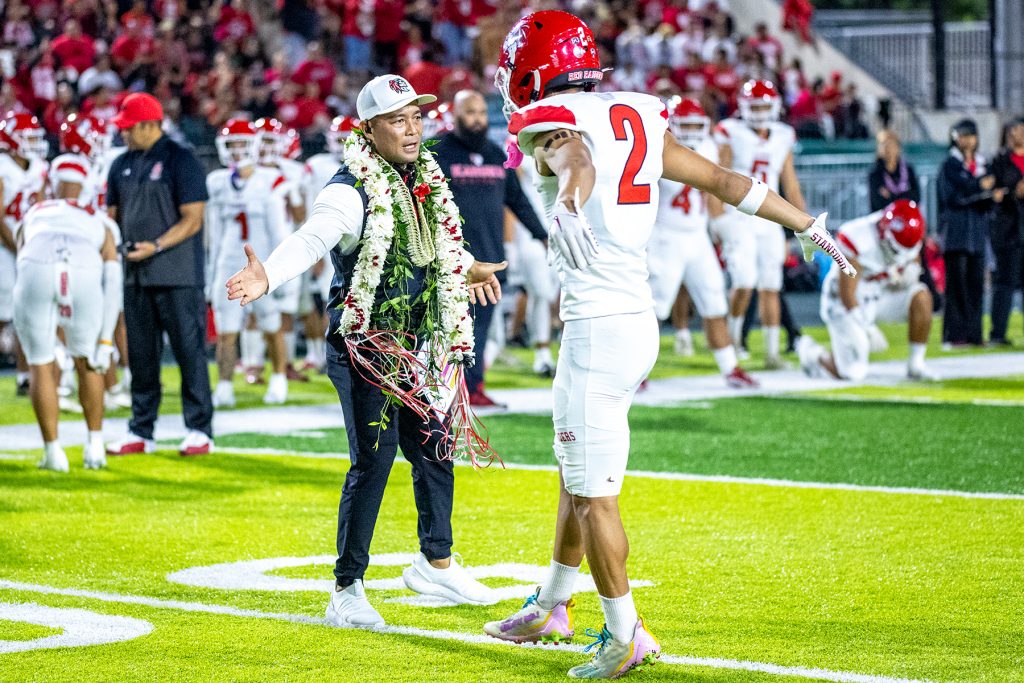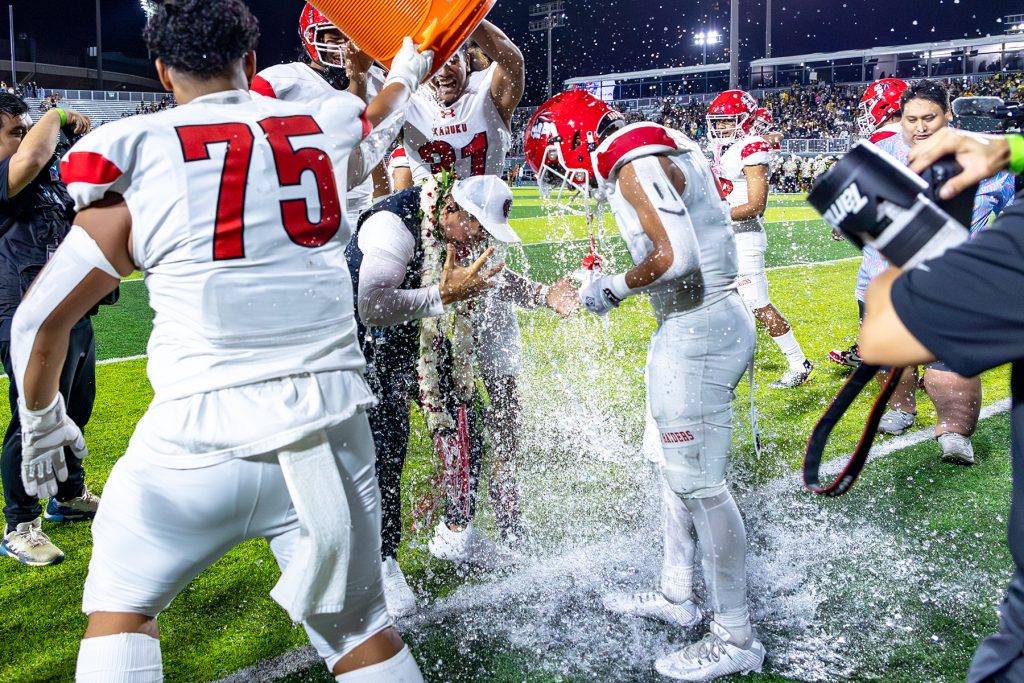Despite 12 years of experience at Kahuku, Sterling Carvalho’s path to becoming head coach faced its share of critics.
In a January 2018 article announcing Carvalho’s hiring, a commenter criticized the Red Raiders, comparing them to Alabama and questioning their constant coaching changes.
“Kahuku acts like they’re Alabama or something, changing coaches like they change their underwear,” the commenter wrote. “Stop trying to be like Saint Louis; it will never happen. I understand that the only reason Kahuku is recognized is because of Saint Louis. Saint Louis is what put Kahuku on the map.”
This sparked backlash from some Hawaii football fans, but even within the Kahuku community, doubts lingered—especially with Carvalho’s plan to shift the Red Raiders towards a passing game.
“The culture before was smash-mouth football, ground-and-pound,” said Carvalho. “Now, you have this guy who wasn’t an alumni or graduate of Kahuku High School, coming from Kauaʻi nonetheless, taking over this program—this storied-tradition program—and trying to pass the ball, doing things differently.”
Skepticism was inevitable. Yet, despite the doubters and the high-pressure environment at Kahuku, Carvalho and his coaching staff remained committed to their vision.
Coaching was in Sterling Carvalho’s blood and upbringing.
His father, Steven, was a coach, and Sterling, along with his twin brother, Stewart, grew up deeply immersed in Kauaʻi’s sports scene. They spent their childhood on football fields, basketball courts, and volleyball arenas—wherever their dad was coaching.
The Carvalho twins began as water boys but soon became competitors, constantly pushing each other to excel in every sport. Supervisors often hesitated to match them against each other, knowing the brothers would battle ferociously.
“He was my fiercest competitor,” said Sterling. “We would go ‘til blood comes out.”
Their dad coached nearly every sport the boys played, holding them to high standards.
Yet, it was Carvalho’s high school coaches who had the most profound impact on his path.
Starting school early, Sterling was just 17 when he completed his first semester of college. “My mom started us in school early,” he told Hawaii Prep. “She had six kids, so she wanted us out of the house already.”
As a result, the twins were younger and smaller than their classmates. Despite this, they earned spots on several sports teams at Kauaʻi High School. Sterling played football, track, basketball, and volleyball, building strong relationships with his coaches in each sport.
“They did not just teach me about the game, whether it be football or basketball or track,” he said. “They taught me life lessons. They taught me how to be a better person. They taught me how to serve in a community.”
As a quarterback for the Red Raiders, Sterling was especially close to his coach Bill Arakaki, whom he considered a father figure. Arakaki believed in Carvalho, granting him a degree of autonomy that was uncommon for high school players. The QB was trusted to call audibles—changing plays at the line of scrimmage—while his input was factored into game-planning. Carvalho helmed the 1991 Red Raiders team that won the Kauaʻi Interscholastic Federation championship, ending the school’s football title drought.
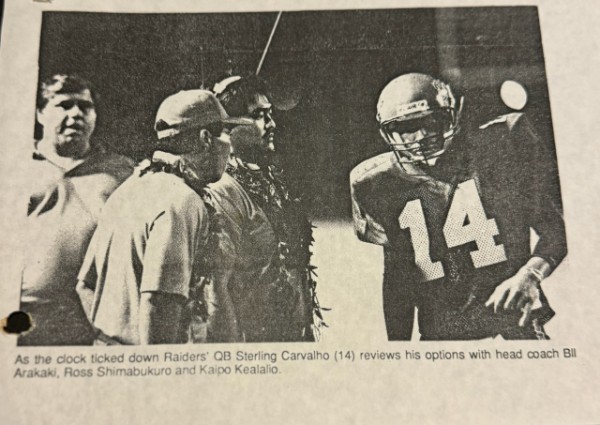
Arakaki’s faith, and the results it produced, bolstered Carvalho’s confidence. “That’s when I really started to figure, if I can do this as a player, I can do this as a coach,” said Sterling.
Inspired by Arakaki and his coaches, Carvalho aspired to be a teacher and coach. After high school, he moved to Oʻahu to study education at BYU Hawaii. “I knew then I wanted to become a coach so I could influence others, like how my coaches influenced me,” he said.
At BYU, Carvalho met his future wife, Kali, a cheerleader and fellow education major from Utah. As a devout LDS Church member, he completed a mission in upstate New York before finishing his bachelor’s degree. He then stayed on Oʻahu with Kali, transferring to UH Mānoa for his master’s.
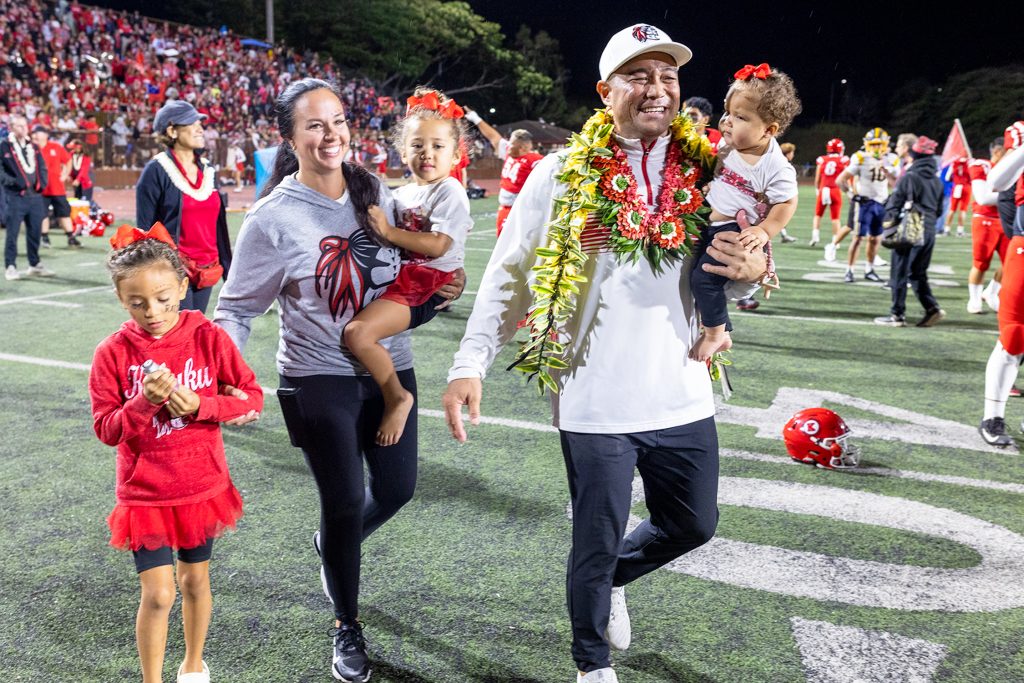
Early in his coaching career, Carvalho joined Kahuku High School after a five-year stint at Waialua High School. He became part of Kahuku’s football staff under head coach Reggie Torres in 2006. For the next nine years, Carvalho served as the Red Raiders’ offensive coordinator, learning time management and accountability from Torres. “Reggie Torres, he accounted for every minute,” said Carvalho. “I almost wanna say every second, he accounted for.”
Under Torres, the Red Raiders won three state championships and posted a 75–14 record in eight seasons. However, Torres was dismissed after the 2013 season.
During this time, Carvalho became head coach of Kahuku’s JV football team while the varsity team faced instability with coaching changes. Lee Leslie replaced Torres in 2014 but was soon succeeded by Vavae Tata. After two years, Tata was not rehired, and Carvalho was a finalist for the position but was passed over for Makoa Freitas. Freitas led the team to an 11–2 record and an OIA title, but they fell to the Saint Louis Crusaders, coached by Cal Lee, in the state championships with a close 31–28 defeat.
For reasons unknown, Freitas’ tenure was deemed temporary, and after one season, the Red Raiders sought a new head coach.
By then, Carvalho was the athletic director at Hawaii Technology Academy, teaching math and Spanish. He was a natural choice for the head coach position, and in 2018, Carvalho was appointed to lead Kahuku’s varsity team.
One of his first decisions as head coach was to add his brother, Stewart, to the coaching staff.
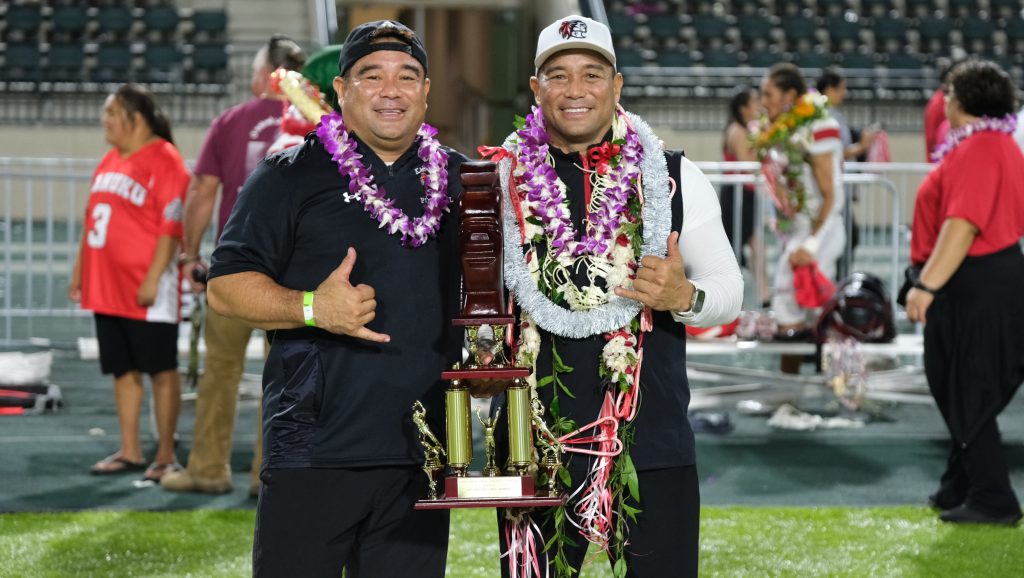
“We’ve been through everything together,” said Sterling. “We can agree to disagree, and that’s what I like about him. He’s willing to be honest with me. And at the end of the day, I just knew he had my back.”
Stewart, a qualified assistant coach, had played as a running back for the DI Utah Utes after high school.
Sterling’s initial tenure didn’t meet Kahuku’s high expectations. In his first year, the Red Raiders finished 7–5 and reached the state semifinals, but their postseason ended with a 49–22 loss to Cal Lee’s Crusaders, who secured their third consecutive state title.
“It was hard, because, coaching here at Kahuku, it’s championship or nothing,” said Sterling. “Anybody would have taken a trip to the OIA championships and a trip to the state semifinals, and they would be happy.”
The Red Raiders showed improvement in Carvalho’s second year, going 9–4 and reaching the state title game. However, they lost twice to Saint Louis, with a 28–0 defeat in the regular season and a 45–6 blowout in the state championships.
Despite these losses, Carvalho earned another year as head coach, becoming the first Kahuku football coach since Torres to last more than two seasons. His motivation was fueled by his experiences with Cal Lee and his brother, Rob Lee.
“The Lee brothers, at that time, were at the pinnacle of their coaching career. I mean, they won four straight state championships,” said Carvalho. “It made me realize that we gotta make sure we become better coaches…Nobody wants to come that close and fall short. So it was extra motivation for us to become successful.”
Throughout the pandemic, Carvalho focused on enhancing his game plan and team culture at Kahuku, emphasizing hard work, humility, and accountability, while meticulously recording attendance at every practice. His efforts were supported by strong buy-in from players and parents.
In 2021, Kahuku’s improvement was evident as they went undefeated in the regular season and reached the state semifinals. They faced Campbell, while Mililani took on Saint Louis, now led by Rob Lee with Cal Lee still on staff.
Kahuku defeated Campbell 21–0, securing a spot in the state championships. Watching the Mililani-Saint Louis game, Carvalho found himself in an unusual position—cheering for the Crusaders.
“In the public school, OIA, we love to make sure we support each other,” he said. But: “Deep down inside, I wanted Saint Louis.”
Carvalho was driven by a desire for a state title, particularly against the Lee brothers. He was determined to prove who the best team in Hawaiʻi was.
“If you want to be the best, you gotta take the best down,” said Carvalho. “And Saint Louis was the reigning four-time state champion.”
The Crusaders edged out Mililani 27–25, setting up a final showdown with Kahuku. For Carvalho, this was a chance for redemption. Since taking over in 2018, his Red Raiders had consistently lost to Saint Louis, but he was determined to change that.
In a decisive victory, Kahuku defeated Saint Louis 49–14, finishing the season undefeated at 10–0. This win marked a shift in Hawaiʻi football, ushering in a new era as one ended. Sterling Carvalho was named Coach of the Year by the Star-Advertiser, praised for Kahuku’s dynamic offense and pinpoint passing.
Since that championship, the Red Raiders have won every football state title. Carvalho credits the team’s success to the players and Kahuku’s strong winning culture, but his impact is undeniable. Multiple school records, including most receiving yards in a game set by his nephew Kainoa in 2021, highlight his influence.
Entering the 2024 season ranked No. 1 in Hawaiʻi and No. 30 nationally, Kahuku faced Saint Louis again. Despite a close game, the Red Raiders won 14–13 against the Crusaders, led by new head coach Tupu Alualu.
As both teams vie for their respective goals—Saint Louis seeking redemption and Kahuku aiming to defend their top spot—the season remains highly competitive. A win for Kahuku would see Carvalho match Cal Lee’s record of four consecutive state titles, solidifying his place as a transformative figure in Hawaiʻi high school football.



